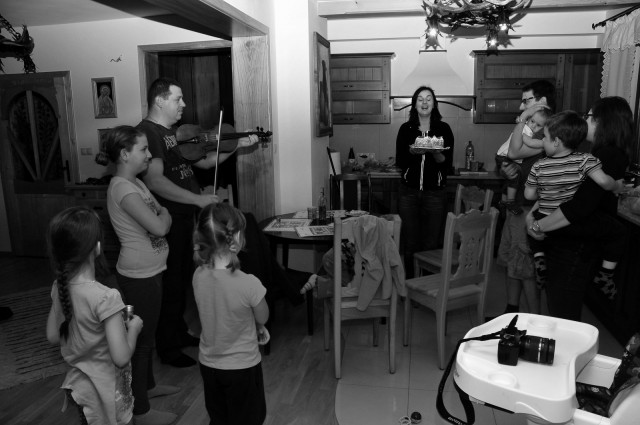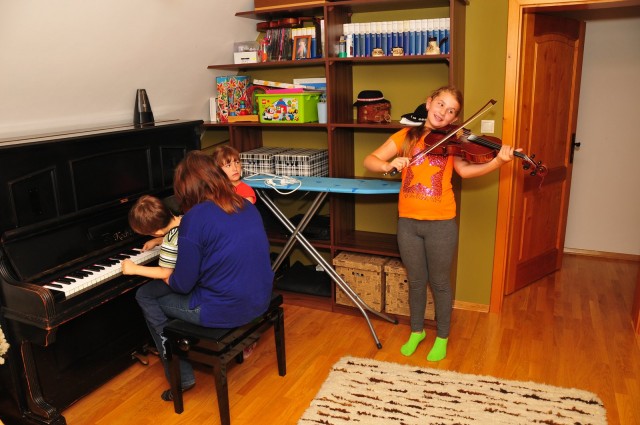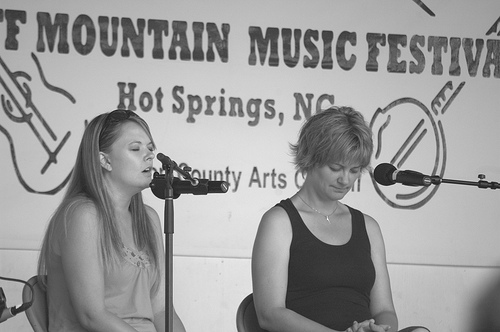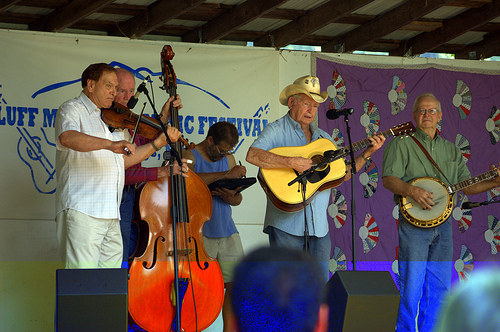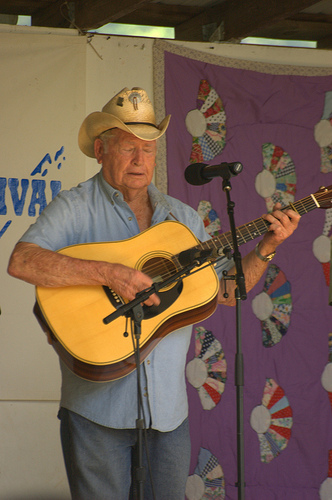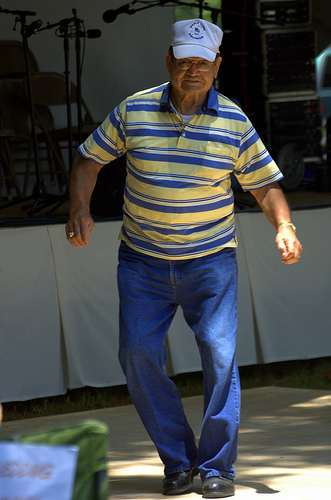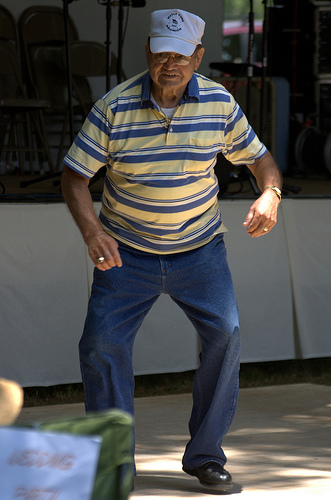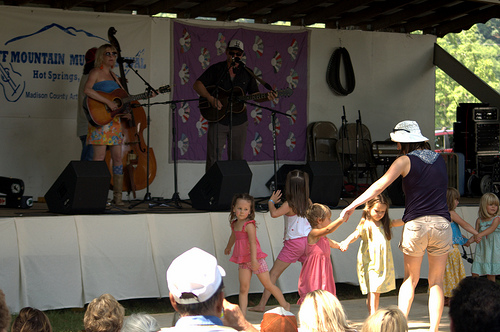What angels sound like.
Ave Maria
Sto Lat
If, the day after your birthday, you visit friends in Poland, you shouldn’t be surprised to get a spontaneous rendition of “Sto Lat”
Sto lat, sto lat,
Niech żyje, żyje nam.
Sto lat, sto lat,
Niech żyje, żyje nam,
Jeszcze raz, jeszcze raz, niech żyje, żyje nam,
Niech żyje nam!
If the friends are deeply rooted in the Polish Highlander tradition, you shouldn’t be surprised when Pan Gospodarz dashes off beforehand and returns with his altówka (viola) to accompany the marry well-wishers.
And with that many instruments, it could hardly come as a surprise that all the kids decide to form a band.
Theme Music
Anyone who has lived in Central Europe probably recognizes this theme song from a Czechoslovakian cartoon called Pohádky z Kechu a Kapradí and known in Poland as Żwirek i Muchomorek.
Barber for Chorus
Beauty
Dear Terrence and Teresa,
Have you ever experienced true beauty? Your lives sometimes seem so lacking in it — the fruits you show in class make me wonder if you’ve ever been struck dumb by something truly, deeply, and unquestionably beautiful.
Listen to this if you haven’t experienced that kind of beauty.
Sincerely,
Your Teacher
School Dance Misogyny Mystery
Dear DJ Splatz (or whatever you clever name is),
I’ll have to admit that I was somewhat surprised, and pleasantly so, when you called down a young man at our school dance this evening for getting a little out of control. Slinging his shirt around and dancing in an overtly sexual manner, he was clearly out of line at a middle school dance. I commend you for calling chaperons’ attention to it and insisting that he leave the dance. At the time, I thought that such a strong response was entirely called for and set a much-needed example for students, and my opinion of you improved greatly. You later began talking about the need to have “good, clean fun,” and while I thought, “My definition of that term is probably different than yours,” I very much appreciated the sentiment.
The next song you selected for the dancers, though, seemed to negate everything you were trying to accomplish with that warning. I’d never heard the song — for I don’t listen to such trash — but the lyrics of the refrain stood out clearly: “To the window, to the wall, / To the sweat drip down my balls (MY BALLS).” At least that’s the lyrics that lyrics007.com displayed when I Googled “window wall sweat drip balls.”
Really? You’re going to reprimand someone for sexually explicit dancing and then play that song? When I read the rest of the misogynistic lyrics of this piece of garbage, I wondered how producers could have cleaned it up for a radio-ready version, so filled it was with the lowest, most degradingly misogynistic profanity imaginable. Which lyrics do you think were going through their mind as the song played, the radio version or the vile original? Of course, we don’t have to wonder about the lyrics coming out of their mouths, but it is particularly distressing to see a bunch of sixth-, seventh-, and eight-grade girls singing (who are we kidding? it’s rap: it’s merely talking, shouting, or mumbling to a generally-computer-generated beat) shouting about sweat dripping off their — well, you get the picture.
So, in closing, if you find yourself this evening wondering why that boy was dancing like a sex fiend, I’d suggest you review the lyrics of the songs you play.
Sincerely,
A Teacher Who Will Probably Never Let His Daughter Go To A Dance He Doesn’t Personally Chaperone
Ecstacy
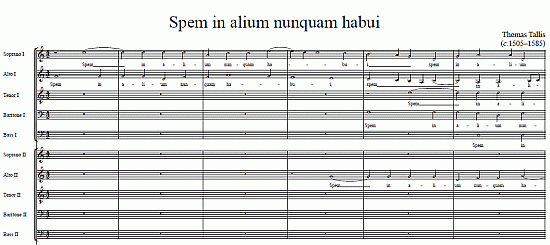
Reading Tony Hendra’s Father Joe: The Man Who Saved My Soul (Amazon) today, I found his first experience with Gregorian chant to resonate with mine, and my experience much sacred music in general. He writes of the sense that this was a timeless music, a music that arose from the passion of the spirit, the soul, instead of the passion of the heart, like most music. I’m not convinced much of what passes for music today could be said to have arisen from the passion of the heart. I rather think its origins are more hedonistic. That being said, much of the music I listened to growing up impressed me with its passion. “Here are people creating from the heart,” I thought.
Then I heard medieval polyphany for the first time. In college, a professor introduced us to Thomas Tallis, and I was immediately in love. Here was the intricacy of the soul itself laid bare. (It’s a bit tragic now that this particular piece will be associated in the popular mind with Fifty Shades of Grey, but the upside, if there is one, is that more people have been exposed to this glorious music and perhaps will investigate Tallis and his contemporaries — Byrd, Desprez, and others.)
Listening to this music, I had, and still have, the experience of ecstasy in the classical Greek sense of ecstasy — ek meaning “outside” and stasis meaning “a stand” — to stand outside oneself.
It was the first real hint I had of the spiritual, the first existential evidence I had of something more.
Biebl’s Ave Maria
There are some pieces of music that defy words, that make it all but impossible to think we’re just chunks of meat walking around, just bags of chemical reactions. This is one of those.
The Song Likely Most Listened to Today
It was the last day of school before Christmas break, and students were waiting for their buses to arrive when one girl mentioned how sad it was that they would never see each other again. “The world is going to end Friday!” she explained. Nothing can get fourteen-year-olds excited than superstition, and before long, the room was abuzz with talk about what Friday would hold for us. This particular young lady — I’ll call her Susan — was convinced that all the hype about the Mayan calendar was anything but hype.
“I’m serious!” she insisted. “We won’t be coming back to school.” Everyone discussed it a while, and all remained unchanged. After a few minutes, when the conversation had apparently died down, a skeptic, upset that the end of the world was once again the primary topic of conversation, got upset: “Man, don’t talk about it. You’ll jinx things!”
The day is almost over, and I guess we all feel fine.
Przy Hornej Dolinie
From time to time, I’ll be sharing a few Polish Christmas carols as we approach Christmas. Perhaps commentary, explanation, or translation would be helpful, but for now, just enjoy the music.
 Przy hornej dolinie w judzkiej krainie
Przy hornej dolinie w judzkiej krainie
Paśli my owiecki przy Betlejemie
A jaÅ„dzioły z jaÅ„dziołami
A pastuski z pastuskami
Do Betlejema, do Betlejema
My tyz haÅ„ pódziemy, owce zawremy
Jezuskowi dary od nos weźniemy
Parzenice z oscypkami,
A oscypki z plecionkami
Ku obdziwieniu, ku obdziwieniu
Current Obsession
This is the song that the Girl, through her enthusiastic, dramatic singing, has drilled into my head, K’s head, and likely little E’s head.
“Honey, could you sing a different song?” is our little refrain to this particular number.
The Story of Three Tempi
A little over two years ago, K and I invested in a digital piano with our tax return windfall. The Girl was taking an increasing interest in music, and guitar is not an ideal instrument for youthful, musical experimentation and discovery: you really have to coordinate both hands at once to get anything vaguely meaningful unless you’re in an open tuning with a slide. Having taken piano lessons for several years in my youth, I was also eager to rediscover the piano.
Since then, I’ve combed my old piano books for familiar and new. One of the pieces I’ve fallen in love with and begun working on is Mozart’s “Fantasia No. 3 in D minor”, K. 397. Naturally, I turned to YouTube and found three radically different interpretations.

You can tell a lot just by looking at the times of the video: Jorg Demus’s version clocks in at 4:12; Gould’s lasts an excruciating 8:22; Arrau’s, a reasonable 6:07. Just from looking at the times, you see that Demus is playing twice as fast as Gould, who in turn is taking a tempo thirty percent slower than what seems reasonable.
Jorg Demus plays it like he’s taken a whole bottle of speed. At this speed, the second part of the piece, which transposes into D major, sounds almost like a tape played at double-speed. This portion is marked allegretto, which Demus seems to think is synonymous with presto. It’s most painful at the 3:30 mark. In fact, as I listen, it sounds like it must be artificially accelerated.
 Gould, on the other hand, plays it like he’s taken a bottle of valium. Slow, plodding, almost childishly mocking, with typical Gould liberties: erratic tempo, unnecessarily arpeggiated chords.
Gould, on the other hand, plays it like he’s taken a bottle of valium. Slow, plodding, almost childishly mocking, with typical Gould liberties: erratic tempo, unnecessarily arpeggiated chords.
And of course, there’s that ever-annoying Gould humming in the background. I can put up with it on his second recording of Goldberg Variations, but perhaps that’s only out of habit.
 Only Arrau plays it as it seems it should be played. The tempi aren’t exaggerated — allegretto sounds like Allegretto — and there’s enough of a lyrical touch to infuse an artist’s ever-important “interpretation” (often “mutilation”) without compromising the period and making it sound like a Romantic wannabe. Arrau has such a perfect touch that I’d have been partial to his interpretation from the start.
Only Arrau plays it as it seems it should be played. The tempi aren’t exaggerated — allegretto sounds like Allegretto — and there’s enough of a lyrical touch to infuse an artist’s ever-important “interpretation” (often “mutilation”) without compromising the period and making it sound like a Romantic wannabe. Arrau has such a perfect touch that I’d have been partial to his interpretation from the start.
Yes, this is a filler post…
Objective and Subjective Sexuality
Sometimes I wonder whether popular bands shouldn’t hire grammar consultants for their lyrics. I was listening to the Black Crows the other day, and as “Hard to Handle,” the Isbell/Jones/Redding standard, played, I noticed a grammatical flaw made the protagonist accidentally bisexual:
Actions speak louder than words
And I’m a man of great experience
I know you’ve got another man
But I can love you better than him.
I’m sure the lyricist meant, “I can love you better than he,” which is an elliptical version of, “I can love you better than he can love you.” Choosing the objective “him” instead of the subjective “he” simply means he’s loving the guy. Adds a whole new meaning to the earlier line about being “a man of great experience.”
The Beatles also fell into this exact same trap: using the objective case pronoun when it should have been the subjective case. This time, though, the song inadvertently turns the two girls between which the narrator is dithering into bisexuals:
If I give my heart to you
I must be sure
From the very start
That you would love me more than her
I’m sure Freud would have loved these.
Bluff Mountain 2011
It’s a yearly tradition for us, going back to our first full summer her in 2006: the Bluff Mountain Festival in Hot Springs, North Carolina. A few hundred people get together to listen to old-time music, bluegrass, and a bit of country (not the same types of music at all: the latter two are derivatives of old-time music) under the shade of oaks and magnolias.
There are ballad singers who are keeping alive music that has roots in the original settlers’ English, Welsh, and Scottish culture.
There are bluegrass bands with well over a century of playing experience among the members.
What I’ve always loved about Bluff is the combination of old and young: the sense of continuity and community is encouraging in these extremely divided times.
That sense of ageless community is nowhere more apparent than the clogging floor set up in front of the stage. In years past, there were two groups that clogged: the Green Grass Cloggers (who celebrated their 40th anniversary this year) and the younger crew, the Cold Mountain Cloggers.
This year, the members of the Cold Mountain troupe were unable to perform as a group, spread about the area at various other events, but when the Green Grass Cloggers were finishing up, they invited the dancers present to come out and join them, making for an interesting combination of Western and tie-dyed shirts.
Yet the Green Grass Cloggers only danced periodically. The majority of the time, audience members took to the plywood dance floor.
Watching the men and women in their sixties and seventies come up to relive their youth made me realize how deep the music runs in mountain culture of old. Everyone learns a bit of clogging; everyone learns to play (or play at) some kind of instrument; everyone sings along with the majority of the performers.
At the other end of the spectrum are the children from the audience who see the dancing, hear the itching rhythm of the instruments, and want to move. They get on the floor and jump, shake, twirl, hop, run, skip, tumble, and anything else that comes to mind.
“That’s some mighty fine dancin’ goin’ on down there,” a performer might encourage.
Mighty fine indeed.
